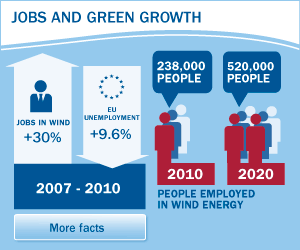 A report published by Citibank, a major international bank, has found that the future of shale gas in Europe is shrouded in uncertainties and the energy technology may not be as viable as had been previously claimed.
A report published by Citibank, a major international bank, has found that the future of shale gas in Europe is shrouded in uncertainties and the energy technology may not be as viable as had been previously claimed.
The same report found that renewables will cost the same as conventional fuels (including gas) in many parts of the world in the very near term. “The cost of renewables is falling fast,” it said.
The Citibank report, first published in September 2012, says that in Europe shale is likely to be particularly challenging to extract, leading to a higher than predicted level of uncertainty surrounding the industry’s future. “Even if shale gas resources are as large as initially reported, it is unknown to what extent shale gas will be recoverable in practice,” it said.
Poland – a country which rushed to develop its shale gas reserves in 2007 – proves this point, as “producers have so far failed to establish a viable shale gas industry, despite 112 exploration licences having been issued,” the report says.
 If all the costs of fossil fuel power generation were detailed in German power bills they would exceed the costs of renewable energy “by a wide margin”, a study by Greenpeace Energy Germany and the German Wind Energy Association (BWE) says.
If all the costs of fossil fuel power generation were detailed in German power bills they would exceed the costs of renewable energy “by a wide margin”, a study by Greenpeace Energy Germany and the German Wind Energy Association (BWE) says.
Currently German power bills clearly outline the cost of the EEG – the support that is channelled to renewable energy and charged to the consumer as a levy – but the costs of conventional fuels are hidden. “State incentives for nuclear and coal are sometimes part of rules that increase the price of power and sometimes part of government budgets. In both cases consumers cannot directly see the full cost in their power bills,” the report says.
In 2012 the EEG levy cost the consumer €c3.59 per KWh, while the report estimates that if there were a similar levy for fossil fuels it would cost €c10.2 per KWh – almost three times as high as the EEG.
 More than two-thirds of Americans want the US to place more emphasis on generating domestic energy using wind power, according to a new Gallup public opinion poll.
More than two-thirds of Americans want the US to place more emphasis on generating domestic energy using wind power, according to a new Gallup public opinion poll.
Published 27 March, the poll results noted that 71% of those surveyed said the nation should put more emphasis in the future on developing wind power. When broken down by political ideology, the poll results showed 83% of those who identified as Democrats favoured more wind power, while 59% of Republicans felt the same way.
“Far fewer want to emphasise the production of oil (46%) and the use of nuclear power (37%),” an accompanying Gallup press release said. “Least favoured is coal, with about one in three Americans wanting to prioritise its domestic production.”
“Republicans and Democrats disagree most on the priority that should be given to oil as a future energy source — with 71% of Republicans wanting more emphasis placed on it, compared with 29% among Democrats,” the press release said.
 The International Monetary Fund (IMF) has just published a report showing that almost 9% of all annual country budgets are spent supporting oil, natural gas and coal industries through direct subsidies, consumer rebates and avoided taxes on pollution. The report estimates that worldwide subsidies to fossil fuels total $1.9 trillion [€1.5 trillion] – the equivalent to 2.7% of global GDP, or 8% of government revenues, the IMF says.
The International Monetary Fund (IMF) has just published a report showing that almost 9% of all annual country budgets are spent supporting oil, natural gas and coal industries through direct subsidies, consumer rebates and avoided taxes on pollution. The report estimates that worldwide subsidies to fossil fuels total $1.9 trillion [€1.5 trillion] – the equivalent to 2.7% of global GDP, or 8% of government revenues, the IMF says.
Wind energy is frequently criticised in the media and by some politicians because it receives government support – which is true. But, have those who raise these views ever stopped to think about the enormous sums in government support fossil fuels have received over their lifetimes – and still do as the latest IMF data testifies?
As a means of comparison, in 2011 alone the International Energy Agency estimated that global fossil fuel direct subsidies were worth $523 billion, compared to $88 billion for renewables.

Ed Davey
While debate in the media rages on whether the UK’s green energy policies will raise electricity bills or not, Ed Davey, UK Secretary of State for Energy and Climate Change, has said that onshore and offshore wind power together cost householders only £18 a year in total, according to a Guardian article.
Moreover, Davey said that wind power is needed for the UK’s energy mix to insulate it from global gas prices: “Global gas price hikes are squeezing households. They are beyond any government’s control. The analysis shows that our strategy of shifting to alternatives like renewables and of being smarter with how we use energy is helping those who need it most to save money on their bills.”
The same article noted that UK government analysis published on Wednesday shows that 85% of the current average UK electricity bill (£1,250/year) cannot be controlled by the government because it is determined by international gas and electricity prices, transmission and metering costs.
 A report published by Citibank, a major international bank, has found that the future of shale gas in Europe is shrouded in uncertainties and the energy technology may not be as viable as had been previously claimed.
A report published by Citibank, a major international bank, has found that the future of shale gas in Europe is shrouded in uncertainties and the energy technology may not be as viable as had been previously claimed.






 Comments
Comments



